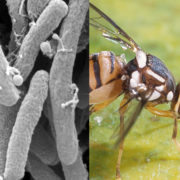Can Apulia’s olive trees be saved?
ORIGINAL PAPER
Rodrigo P. P. Almeida. Department of Environmental Science, Policy and Management, University of California, Berkeley, CA, USA
Summary
On 21 October 2013, the Italian phytosanitary service notified the European Commission (EC) that the plant pathogen Xylella fastidiosa had been detected in olive trees near Gallipoli, a tourist destination in Italy’s southern region of Apulia. This xylem-limited bacterium is spread by insect vectors and causes disease in crops such as grapevines, citrus, coffee, and almond; various ornamentals; and trees such as oaks, elms, and sycamores. Because of the risks of X. fastidiosa being introduced, established, and spread throughout Europe, this species is a regulated quarantine pest. Yet, X. fastidiosa has been left unchecked and has marched northward, leaving destruction in its wake. The establishment of X. fastidiosa in Italy has been an agricultural, environmental, political, and cultural disaster.
Published on July 22, 2016 by SCIENCE









